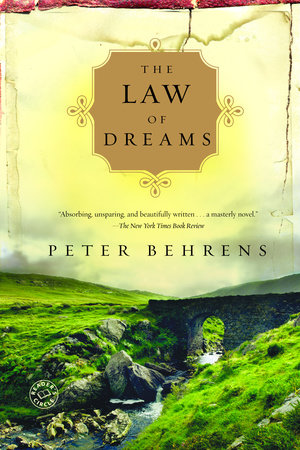The Law of Dreams Reader’s Guide
By Peter Behrens


1. What do you think the title of the book means?
2. The book is told from Fergus’s point of view, except for the prologue, which is told from Farmer Carmichael’s. Why do you think the author made that choice?
3. Is Farmer Carmichael a sympathetic character? Does your opinion of him shift depending on the scene you read?
4. Fergus’s father, Micheal (pronounced Mee-haul), tends to be a rolling stone, except when his family’s life depends on them moving, in which case he stays put. What is the significance of this, and what does Fergus learn from it?
5. Would you describe Fergus’s feelings for Phoebe Carmichael as a “crush” or as something more complicated? What are the symbolic undertones in their repeated ritual of her offering him milk?
6. Why do you think Luke dresses as a boy? Does Fergus think more or less of Luke’s powers as a leader after he discovers Luke is female?
7. Fergus has a strong affinity for horses, do you agree? How does he identify with horses? What, if anything, does he learn from them?
8. Different horses appear at meaningful points in the novel–Farmer Carmichael’s red horse, the blue horse that Fergus chooses at the railway site (and which kills Muck Muldoon), and the black horses that Fergus buys in Canada at the end. Is it significant that each stage of the book has in it a horse of a different color, so to speak?
9. Molly betrays Fergus in some manner three different times. What are these betrayals, and how does Fergus react to each? Do his reactions make emotional sense to you?
10. Fergus’s thoughts are often described in short, one- or two-sentence paragraphs. Is this an effective technique? Does it help shape your impression of the character?
11. The epigraph at the beginning of the book from Thomas McGrath concludes, “May you fare well, compa—ero; let us journey together joyfully,/ Living on catastrophe, eating pure light.” How does this quote capture the book’s themes?
12. Fergus often implores himself in the book to keep moving forward. What is the broader significance of his moving forward? What happens to the people in the book who stay put?
13. Fergus would likely be diagnosed with what we now call post-traumatic stress disorder. How would you imagine the events in the book shaping his personality down the line?
14. What impressions of the Famine did you have before reading this novel? How has this book affected those impressions?
15. This novel is based on Peter Behrens’s own family history. How and when did your family come to the United States? What do you think the journey was like?